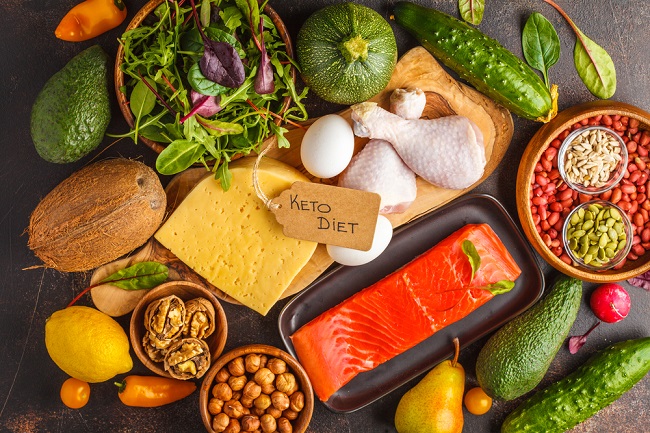Know the Side Effects of Keto Diet
Diet keto is believed to be able to lose weight in a short time and good for diabetics. But behind the results that look promising, keto diet can bring side effects. Side effects of keto diet ranging from digestive disorders to diabetic ketoacidosis in diabetics are dangerous.
Diet keto is a diet by limiting carbohydrate consumption and replacing it with protein and fat. This method utilizes ketosis conditions due to certain metabolic processes in the body.

The body gets energy mainly from carbohydrates. But when the carbohydrate intake is reduced, the body will decompose the fat which is then processed into a molecule called ketone, to convert into energy. This condition is called ketosis, and can occur if the carbohydrate intake is very low, as in the keto diet rule or if not eating for long periods of time.
Side Effects of the Keto Diet
The keto diet has been shown to reduce seizures in epilepsy, reduce HbA1c levels in people with type 2 diabetes, help maintain mood stability for people with bipolar disorder, and lower cholesterol in obese people. However, this method provokes a variety of criticisms mainly due to the side effects of keto diet which among others are as follows:
- Flu-like symptoms
People who are just starting this diet may experience flu-like symptoms that include headaches, fatigue, and muscle aches. Some people who go on keto diet can also experience nausea, weakness, lack of concentration, and difficulty sleeping. - Bad breath
Bad breath is the most common side effect of keto diet. Bad breath is caused by acetone, a ketone-like substance that is a by-product of fat metabolism. The smell of acetone (like a cleansing liquid) may be noticeable in the early days of the keto diet. - Aggravating kidney disease
The keto diet limits carbohydrate intake and replaces it with protein and fat. This high-protein diet can aggravate kidney work that ultimately aggravates the condition of kidney pain. Some experts also believe a high-protein diet makes kidney stones worse. - Osteoporosis
A high-protein diet keeps the amount of calcium wasted on urinating more. Experts argue, the condition may increase the risk of osteoporosis. But this still needs further research. - Disorder digestive
Dietary changes can lead to digestive disorders. In keto diet, constipation is the most common digestive disorder. This is due to inadequate consumption of fiber and water. Some people may also have diarrhea, although it is rare. But for sure, you will feel very hungry and weak because it consumes very little carbohydrate. - Muscle cramps
People who are on keto diet may also experience muscle cramps. The cause is mineral loss and dehydration. When on a keto diet, protein intake also increases. This high-protein diet is at risk of increasing uric acid levels and can cause joint and muscle pain. - Increased heart rate
Other side effects of keto diet are increased heart rate or palpitations (palpitations). Dehydration and low salt intake are the main cause of this effect. - Ketoacidosis
Diabetic ketoacidosis is a dangerous condition when the levels of ketone in the blood are very high and make the blood pH down (to acid). Diabetic ketoacidosis can lead to coma to death. People most at risk of this experience are diabetics. Symptoms of diabetic ketoacidosis, namely:- Frequent urination.
- Feel thirst or mouth feels dry.
- Nausea and vomiting.
- Abdominal pain.
- Shortness of breath.
- Limp, dazed, and tired.
- Scented breath like a fruit.
For diabetics, if you notice any of these symptoms, get to the hospital for early treatment.
How to Minimize Side Effects of the Keto Diet
To minimize the side effects of keto diet, there are several ways you can apply:
- Drink plenty of water
When undergoing keto diet, balance by drinking water at least two liters per day. This is to prevent dehydration, especially early in the diet. - Reduce carbohydrates gradually
To ease the transition, subtract carbohydrates gradually before actually taking a keto diet. This is done so that your body is familiar with the metabolic changes that will occur when undergoing keto diet. - Maintain mineral intake
Trimming carbohydrates in your daily diet does not mean ignoring other nutritional needs, including minerals. Meet the needs of potassium and magnesium by eating bananas. Both of these minerals can overcome muscle cramps. - Eat enough salt
Some salt comes from carbohydrates. When carbohydrate intake is reduced, meet the need for salt by adding it to food. - Avoid heavy exercise
When you're just starting a diet, a sense of weakness may be felt. Therefore, do not force yourself to exercise hard. - Expand fiber
Consume low-carbohydrate and high-fiber foods to avoid constipation, such as whole grains, nuts, low-carbohydrate fruits and vegetables.
Given enough side effects of keto diet, this diet is not recommended to be done in the long run, especially if your goal is just to lose weight. Diet keto is claimed to lose weight in a relatively short time. But less is not fat or muscle mass, but the water in the body.
Losing a healthy weight not only changes your diet, but also keeps up with the sport. To find a diet that suits your body needs, it is advisable to consult a nutritionist. Talk to your doctor before dieting keto, so that side effects keto diet can be avoided.